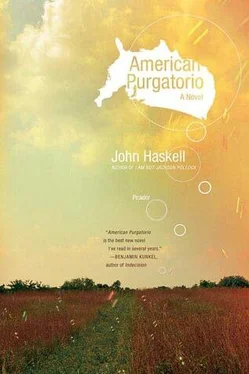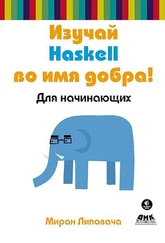John Haskell - American Purgatorio
Здесь есть возможность читать онлайн «John Haskell - American Purgatorio» весь текст электронной книги совершенно бесплатно (целиком полную версию без сокращений). В некоторых случаях можно слушать аудио, скачать через торрент в формате fb2 и присутствует краткое содержание. Год выпуска: 2006, Издательство: Picador, Жанр: Современная проза, на английском языке. Описание произведения, (предисловие) а так же отзывы посетителей доступны на портале библиотеки ЛибКат.
- Название:American Purgatorio
- Автор:
- Издательство:Picador
- Жанр:
- Год:2006
- ISBN:нет данных
- Рейтинг книги:3 / 5. Голосов: 1
-
Избранное:Добавить в избранное
- Отзывы:
-
Ваша оценка:
- 60
- 1
- 2
- 3
- 4
- 5
American Purgatorio: краткое содержание, описание и аннотация
Предлагаем к чтению аннотацию, описание, краткое содержание или предисловие (зависит от того, что написал сам автор книги «American Purgatorio»). Если вы не нашли необходимую информацию о книге — напишите в комментариях, мы постараемся отыскать её.
Los Angeles Times
American Purgatorio — читать онлайн бесплатно полную книгу (весь текст) целиком
Ниже представлен текст книги, разбитый по страницам. Система сохранения места последней прочитанной страницы, позволяет с удобством читать онлайн бесплатно книгу «American Purgatorio», без необходимости каждый раз заново искать на чём Вы остановились. Поставьте закладку, и сможете в любой момент перейти на страницу, на которой закончили чтение.
Интервал:
Закладка:
“I probably should be going,” I said.
“Okay,” she said, and she turned and started walking up the sidewalk. As I watched her walk I told myself, This is what I have to do, meaning, This is what I feel, meaning, This is who I think I have to be.
7
As I drove around the town of Lexington, it was just me now, just my eyes and my ears and my own intuition, and to facilitate the appearance of that intuition I drove very slowly, unsure where that intuition would be coming from but trusting what I felt, and hoping I would come up with something.
Anne liked horse racing so I drove to a racetrack on the outskirts of town. I watched the horses practicing on the track, their breath steaming in the cool morning air, and then, because I felt like eating, I drove to a bar and grill. I parked the car on the street and went inside, but the grill part was closed. This was just a bar, low-ceilinged and not that glamorous, a long room, three steps down from the street, and half of its tables had chairs stacked on top of them. It smelled like dead beer, and the floor was sticky. It reminded me of a Polish tavern.
As casually as possible I sidled up to the bar and ordered — after seeing a man with a Budweiser bottle — the same thing, taking it to an empty table carved with hieroglyphs. The souvenirs on the walls were dusty. I could hear a buzzing, a high-pitched buzzing from somewhere. No one paid attention as I drank, which on the one hand was a relief and on the other was a disappointment. I might as well have not been there. Which, I said to myself, is fine. I drank my beer, glancing at the television perched at the end of the bar. In it, people were doing things and saying things, and they were all in some relationship with each other.
But not to me.
Light was coming from the street outside, through the diamond-shaped window in the door, and I walked to the door. It was locked. But it was a very simple thing to just turn the little knob of the lock and push the door open, which I did, and it opened. The morning was almost over, I could tell by the light. There was no one on the street, no cars, and since I felt like walking, I did.
I found a coffee shop and went inside. Although I’d said thank god for anger, I was saying now, Thank god it was gone. I was glad to be done with it, glad to be sitting at a counter eating a bowl of chicken-vegetable soup. It was cold enough outside so that the windows had fogged up, and I didn’t notice when the man came in, but when the man sat down on the stool next to me I noticed his smell. I looked up and the man had pulled a tea bag out of his coat and was dipping it into a cup. He held it over the cup, watching it drip, and when it stopped dripping he put the used bag into a pocket of one of his coats. It wasn’t that cold but he was wearing two separate coats. He must have sensed me watching him because he turned to me and looked at me and it looked as if he tried to smile. He showed me his brown teeth, several of which were missing, and kept the same expression frozen on his face. His lower lip stuck out like a shelf, as if it was cut, but it hadn’t quite fallen off.
Then I noticed his stomach, which was swollen, but not from overeating. He wasn’t fat. It was distended, as if something was inside of him, growing inside of him, as if, if it were possible, he was pregnant. The man saw where I was looking and before I could speak he said to me, “I can’t get rid of it.” He looked down at the thing he had down there and patted it.
“I’m sorry,” I said.
“Why?” the man said.
“It’s pretty big,” I said.
“I know,” the man said, and rested his hand on top of it.
“Is it painful?” I said.
“Feel,” he said, smiling. “Feel it.” And he swiveled on his stool. He wanted me to feel his stomach.
“I can see,” I said. “That looks pretty good.”
I saw no need to touch his stomach, but he wanted me to feel it. He reached out, grabbed my hand, and held it, in his. He was holding my hand and I didn’t know quite what would be the appropriate thing to say, so I started explaining to the man about the neurological foundation of pain. I told him it was all in the mind. I explained that when you touch something, you have sensations, but those sensations aren’t pain unless you think they are. “Thinking makes it so,” I said, and I told the man he could have control. I told him that his body was a vehicle.
The man nodded, then guided my hand between the buttons of his shirt. He placed my hand against his taut, damp belly. It was moving with his breathing, up and down, and he pressed it there, or I pressed it there, against his belly, for what seemed like a long time.
And then I pulled my hand away. I slid my bowl of half-finished soup in front of him. I stood up and looked at the man, thinking the man would be looking at me, but he wasn’t. He was drinking his tea. A song about sexual healing was playing on a radio. I wanted to say something to him, and finally, when he did look up, I said something like “Good luck” or “See you later.” And then I walked out. I walked about a block down the street and I realized I was still feeling it. It was still there. I could still feel this person’s belly on my hand.
III. ( Invidia )
1
Just as a person who buys a new pair of shoes notices other people’s shoes, so I was noticing cars. The rest of the day I spent driving around Lexington, around the public housing projects, the vacant lots, the liquor stores, and the “revitalized” downtown, watching cars and the people getting in and out of cars. The people were living their lives, or seemed to be, doing what they could do, given the circumstances they had.
My own circumstances were starting to feel used up. My intuition, which I’d been using to find Anne, or thought I’d been using, was gone. And even if I’d had a full supply, all the intuition in the world wouldn’t find her if she didn’t want to be found. She was the one who’d left me, and if, in fact, she didn’t want me to find her, even if she was still here somewhere (which she probably wasn’t), there was nothing I could do.
I realized I was going about this whole thing all wrong. I’d been trying to find this thing, and since the best way to find something is to stop looking so hard, I decided to stop looking for Anne. Let’s be realistic, I thought, and I turned my attention to the most realistic thing I had, or the most salient realistic thing I had: my teeth. They were covered in a film of day-old plaque from not brushing. So after about an hour of driving I turned onto a road called Circle Road or Loop Road, driving past the motels and strip malls lining the road, looking for a drugstore. It was my habit now to scan the streets and parking lots, so I also did that, looking for something that by this time had become a little hazy in my mind. It wasn’t hard to find a mall, a so-called megamall, filled with music and escalators and a big-brand drugstore. I walked into the upbeat music of the drugstore, bought some toothpaste, and when I walked back out into the parking lot at first I didn’t notice it. It took me a couple of steps before I actually turned around and recognized that the maroon station wagon parked in the middle of the lot was my maroon station wagon.
I wasn’t as excited as I expected I would be. I didn’t start jumping up and down. I mean it seemed to be my old car, but it had a different license plate, a California license. So I sat in my faded red coupe, watching my old maroon car from a distance, feeling that modicum of hope returning. I brushed my teeth with some bottled water, nibbled on some cheese-flavored snack food, reclined in the seat, and generally spent the afternoon drifting in and out of thought with nothing happening to the car or any people connected to the car.
Читать дальшеИнтервал:
Закладка:
Похожие книги на «American Purgatorio»
Представляем Вашему вниманию похожие книги на «American Purgatorio» списком для выбора. Мы отобрали схожую по названию и смыслу литературу в надежде предоставить читателям больше вариантов отыскать новые, интересные, ещё непрочитанные произведения.
Обсуждение, отзывы о книге «American Purgatorio» и просто собственные мнения читателей. Оставьте ваши комментарии, напишите, что Вы думаете о произведении, его смысле или главных героях. Укажите что конкретно понравилось, а что нет, и почему Вы так считаете.











